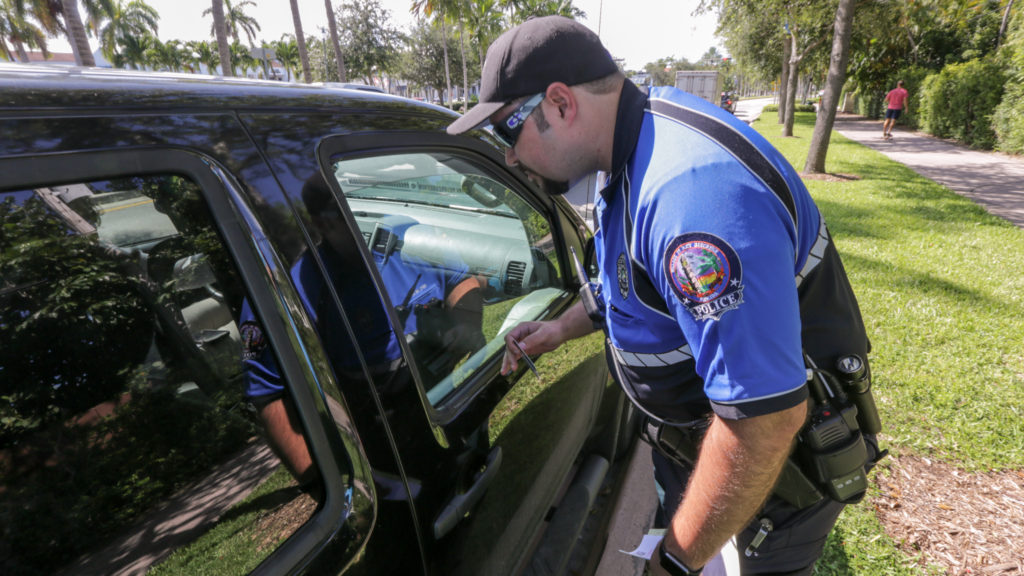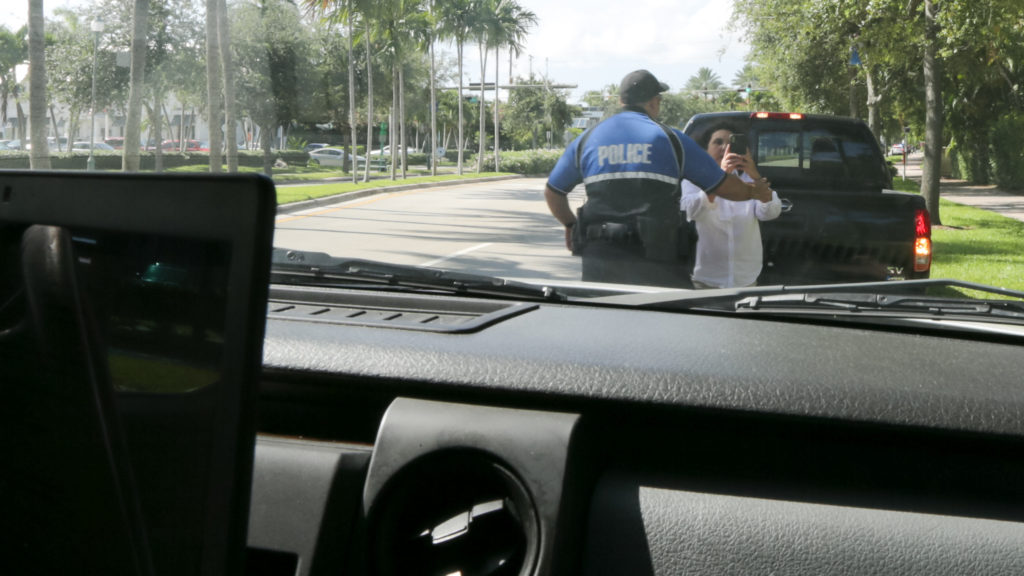Key Biscayne Police Start Ticketing For Texting
Tony WintonJuly 29, 2019

Key Biscayne Police Officer Marcos Diaz holds a citation he is about to give a motorist for texting while drving, as the Department starts enforcement of a new law making the violation a primary offense, July 19, 2019 (Key News/Tony Winton)
On a late Friday afternoon, Key Biscayne Police Officer Marcos Diaz was looking for thumbs.
“That’s what we have to do. We have to see the thumbs and the fingers working,” he said, explaining how the Department is now enforcing Florida’s new texting-while-driving law.
It won’t be easy for police, no matter how motivated they are, to reduce the thousands of distracted driving crashes in Miami-Dade County.
That’s because the definition of what texting while driving means remains very narrow – and requires that an officer see a person actually send a text or email while a vehicle is in motion.
The main change is that now the violation is a “primary” offense, which means an officer can pull you over for a texting violation alone, without having to notice some other infraction first.
—

Key Biscayne Police Officer Marcos Diaz tells a woman to return to her vehicle after he had earlier ticketed her for texting while driving on Crandon Boulevard, July 19, 2019 (Key News/Tony Winton)
Sitting in his Ford SUV, Diaz spots a driver who is manipulating a phone, but he can’t see any texting.
No stop.
Another. And another.
Finally, after about an hour, he sees a female motorist on her phone, typing. He flips on the lights and pulls her over. Another officer arrives in a moment for backup.
At windowside, the motorist starts quoting the law to Diaz. She tries to argue that she was not in motion, but Diaz says he saw the car rolling. She is handed a summons, and Diaz is back in his SUV.
A moment later, visibly angry, the motorist jumps out of her car and into traffic on Crandon Boulevard. She is snapping pictures with her phone, saying she was being harassed, and upset that she was being photographed.
Diaz now gets out of his car, urging her back into her vehicle.
“Ma’am. Get back in the car!” he commands. She continues to take pictures of the officer.
She finally listens, gets into her car, and leaves.
“See what it’s like out here?,” Diaz says. He says he was close to placing her under arrest.
—
For Key Biscayne Police Chief Charles Press, it is the start of what he knows will be a difficult but necessary culture change – aware that many people can’t resist the urge to operate smartphones when they shouldn’t.
“It is an addiction,” he says. “It affects the body like a drug does, similar to a runner’s high.”
The solution is “consistent, fair and firm enforcement,” Press said, adding he hopes Florida’s law will mirror the one in New York State.
One place where he expects strong enforcement is in school zones and work zones. In those areas, officers need not see a person texting. Merely holding a cellphone is enough.
“There is no other way to do it,” Press says. “The statistics don’t move people. The pocketbook is the only way you are going to change behavior.”
Penalties start with a base $30 fine for a first offense, increasing to $60 and three points assessed against the driver’s license.
For not using a device in hands-free mode in a school or work zone, the offense is considered a moving violation, with a base $60 fine and three points assessed against the driver’s license.
The school and work zone ban on handheld use goes into effect Oct. 1.



Responses
Charles Sherman
Jul 29
I wish the police would stop drivers from running stop signs on the Key. It’s epidemic.
The comments are closed.